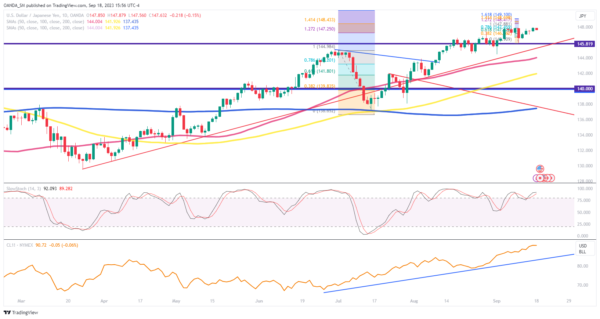- UAW President Fain on latest offer – “It’s definitely a no-go.”
- A prolonged UAW strike could disrupt the US growth exceptionalism trade
- The impact of the strike is not as disruptive but it could lead to a lengthier period of production disruption
The three Detroit automakers and the United Auto Workers (UAW) union appear to be far from ending the strike that has now entered its fourth day. It is clear that American car manufacturers, Ford (F), GM (GM), and Stellantis (STLA) will be having higher costs once a deal is reached. There has been some relief that onset of the strike won’t be as bad as initially thought. The longer the hold out, the greater the impact on the economy.
These negotiations might last a while as many autoworkers haven’t had a meaningful raise in over 15 years. The union is looking for wage increases of 36% over the next four years, which matches what chief executives have received. In addition to wage increases, they are also looking to bring back pensions. Over the weekend, the UAW rejected a 20% offer from both Ford and GM, while Stellantis proposed a 21% increase.
The longer this strike lasts, the greater the impact on the economy, which will eventually impact the FX market. An extended strike that lasts more than a couple weeks, will start to rattle markets. It seems, Wall Street has priced in a short strike already, but the risk that this lasts more than a couple weeks is growing.
USD/JPY Daily Chart
The dollar-yen trade remains focused on the BOJ commitment to an ultra-easy monetary stance and US growth exceptionalism and rising risks of more Fed tightening. If this week’s central bank actions by the Fed and BOJ don’t lead to any surprises, the bullish trend could remain intact. Unless growth prospects start to take a turn for the worse in the US, the dollar might remain supported over the short-term.
Key upside targets the 148.25, while downside eyes the 147.00 region. Major support remains at the 144 level, while upside targets remain the 150 price barrier.

